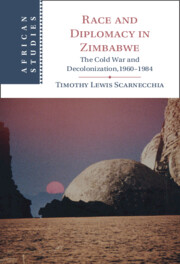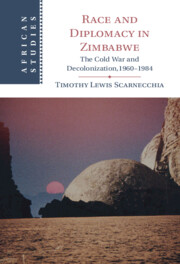Refine search
Actions for selected content:
8 results
4 - “We Don’t Give a Damn about Rhodesia”
-
- Book:
- Race and Diplomacy in Zimbabwe
- Published online:
- 02 March 2023
- Print publication:
- 09 March 2023, pp 96-130
-
- Chapter
-
- You have access
- Open access
- HTML
- Export citation
6 - Negotiating Independently
-
- Book:
- Race and Diplomacy in Zimbabwe
- Published online:
- 02 March 2023
- Print publication:
- 09 March 2023, pp 165-202
-
- Chapter
-
- You have access
- Open access
- HTML
- Export citation

Race and Diplomacy in Zimbabwe
- The Cold War and Decolonization,1960–1984
-
- Published online:
- 02 March 2023
- Print publication:
- 09 March 2023
-
- Book
-
- You have access
- Open access
- Export citation
9 - Uncommon Law: The Reach of British Justice
- from Part II - Registers
-
- Book:
- Untied Kingdom
- Published online:
- 16 February 2023
- Print publication:
- 16 February 2023, pp 256-290
-
- Chapter
- Export citation
8 - Conclusion
-
- Book:
- Struggles for Self-Determination
- Published online:
- 25 November 2021
- Print publication:
- 02 December 2021, pp 284-292
-
- Chapter
- Export citation
4 - “We Don’t Give a Damn about Rhodesia”
-
- Book:
- Race and Diplomacy in Zimbabwe
- Published online:
- 14 September 2021
- Print publication:
- 23 September 2021, pp 96-130
-
- Chapter
- Export citation
6 - Negotiating Independently
-
- Book:
- Race and Diplomacy in Zimbabwe
- Published online:
- 14 September 2021
- Print publication:
- 23 September 2021, pp 165-202
-
- Chapter
- Export citation

Race and Diplomacy in Zimbabwe
- The Cold War and Decolonization,1960–1984
-
- Published online:
- 14 September 2021
- Print publication:
- 23 September 2021
-
- Book
- Export citation
